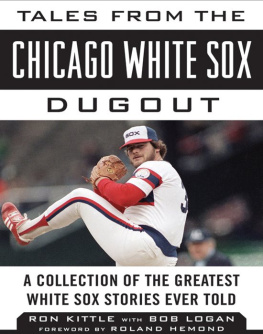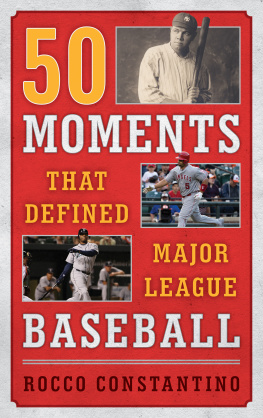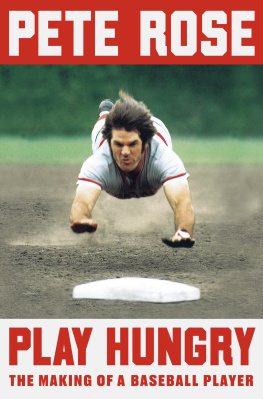Contents
Guide

The author and publisher have provided this e-book to you for your personal use only. You may not make this e-book publicly available in any way. Copyright infringement is against the law. If you believe the copy of this e-book you are reading infringes on the authors copyright, please notify the publisher at:
us.macmillanusa.com/piracy.
YOUR MOTHER ALWAYS WARNED YOU that nothing good ever happened after midnight. But your mother wasnt in a dugout at Fenway Park that night. It was 12:33 on the morning of October 22, 1975. The sixth game of the 1975 World Series had started the day before but, despite four hours of furious play, nothing had been decided yet. The Series had already mesmerized the nation; a back-and-forth affair with three games decided by one run, two involving ninth-inning comebacks. Both teams, laden with future Hall of Famers and unforgettable characters, had given much more than expected. The Series had rescued the previously deteriorating baseball television ratings and revived interest in the game formerly known as the national pastime.
The Cincinnati Reds led three games to two heading into the night; a Boston Red Sox loss in this one would end the Series. By the time the clock passed midnight, Game Six was already being hailed as the greatest World Series game in history. A dramatic three-run pinch-hit home run in the eighth inning had tied the game and brought the home team back from the dead. The potential winning run had been thrown out at the plate in the bottom of the ninth. A miraculous catch against the fence in right field had saved the game in the top of the 11th. As word of the drama spread and late-night viewers tuned in to find their shows bumped but stayed on to witness the spectacle, it became the most watched World Series game ever.
Now, in the bottom of the 12th inning, Red Sox catcher Carlton Fisk made his customary slow, deliberate walk to the plate with a bat in his hand. The man known to all as Pudge was 27 years old. Although he had won the Rookie of the Year Award only four years earlier, it seemed as though he had been playing in Boston forever. Listed at six feet, two inches, his square-shouldered, erect posture made him appear much larger. He was recognized as one of the best catchers in baseball and, more importantly to Red Sox fans, he was a native New Englander who embodied the solid virtues of the regiona beloved homegrown hero who allowed millions of New Englanders to live their dreams through him.
Fisk had established himself as a leader who lived by a strict codea man with a perfectionists drive to excel and a single-minded devotion to duty who tolerated nothing less than maximum effort, from himself or his teammates. He had battled back from a horrific knee injury in 1974 and a broken arm in the spring of 1975, returning to his team on a white steed at midseason to help lead them to the postseason for only the second time in 29 years. The fact that two of his four major league seasons had been cut in half by injuries caused Fisk to be considered fragile. He had no way of knowing that he would overcome his injuries and go on to a 24-year career in which he would participate in the major leagues in four decadesa testament to his hard work and determinationand that he would eventually catch more games than any major leaguer before him and be selected to the All-Century Team and the Hall of Fame.
Fisk also had no way of knowing that both he and Major League Baseball were standing on the precipice of colossal change that in large part would be brought on by what transpired this night. He would be directly responsible for a spark that would combine with a historic court ruling that winter to ignite an uncontrollable chain reaction of increased fan interest, television revenue, and player salaries that would affect the game and its economics in unimaginable ways. He would not only live through the advent of agents, strikes, free agency, and court battles, but he would often be at the center of the triumphs and heartbreaks they would cause.
Everyone in New England made their best foxhole deals with their makers as Fisk approached the plate. Before he stepped into the batters box, he went through his familiar routine, mannerisms that were mimicked and loved by Red Sox fans: he tugged on his sleeves, arranged the dirt of the right-handed batters box with his feet, flexed his shoulders twice, then held the bat with his hands on each end and stretched over his head. He shook his head back and forth, held the bat in front of his face and examined the barrel. Then he stepped in the box and tapped the outside corner of the plate with the bat.
On the mound was rookie Pat Darcy, who had completed two innings in order. Darcys first pitch was high and slightly inside and Fisk barely moved. The second pitch was low, between the belt and knees, starting on the outside part of the plate but moving in. The Reds catcher, Johnny Bench, reached down and left to catch it, but the ball never got there. Fisk unleashed a powerful compact swing and met the ball squarely.
All good hitters learn, through repetition, the welcome sensation of when they get all of onethe unmistakable feeling that goes directly from their hands to their heart. Fisk knew as soon as he made contact that he had hit it hard enough to clear the 37-foot Fenway left field wall.
As Fisk, the umpire, Bench, on-deck hitter Fred Lynn, and millions more watched, the ball soared high into the foggy Boston night, directly down the left field line. For an instant, it appeared to have a slight tail to the left, toward foul ground. Fisk took two sideways crab hops toward first, but didnt run. He continued watching the flight of the ball that carried the fate of his team. He had certainly gotten enough to get it over the wall.
There was only one question now
IN ORDER TO FULLY UNDERSTAND Carlton Fisk, his baseball career and his personality, it is necessary, above all, to know this: he was from New England. Carlton Fisk represented the region and all that it symbolized more than any major league baseball player in history. The principles, the strong will and beliefs, the work ethic, and, perhaps, the stubbornnesshe bore New England as a badge of honor.
Carlton Fisk was as New England as any one person could be. He couldnt have been more New England if his great, great, great, great, great, great grandfather had come over on the Mayflower. He didntbut Phineas Fiske did depart from Suffolk County, England, with his young family sometime between 1620 and 1640. He settled in an area of the Massachusetts Bay Colony that was soon called Middlesex County, a county that included settlements at Lexington and Concord, and raised his family near Groton, which today is just north of the I-495 loop around Boston.
The Fiskes (the e would be dropped from the family name in the mid-1800s) were like the other arrivals to that part of the New Worldthey came not to plunder but to build. They built farms, families, and eventually a new nation. Fiskes were not idlers or dreamers, they were doers. And they were not a wandering bunch. It was roughly 150 years before the first Fiske decided to see what was beyond the mountains: Samuel Fiske made the 80-or-so-mile trek northwest to Claremont, New Hampshire, in the late 1700s. Over the next 200 years, the clan would move exactly 11 miles, just south to Charlestown.
Like most of their neighbors, the early Fisks were farmers. As David McCullough wrote in John Adams : The New England farmer was his own man who owned his own land, a freeholder, and thus the equal of anyone. Cecil Fisk was born into this line of proud, independent, hard workers in 1913. Cecil learned responsibility and self-reliance from his father, Sabin, who, in addition to farming, served as postmaster and delivered the rural mail around Charlestown in a horse-drawn buggy for forty years beginning in 1914. When snow piled up, teenage Cecil would have to help deliver the mail. He learned you didnt complain, you just did what needed to be done.










